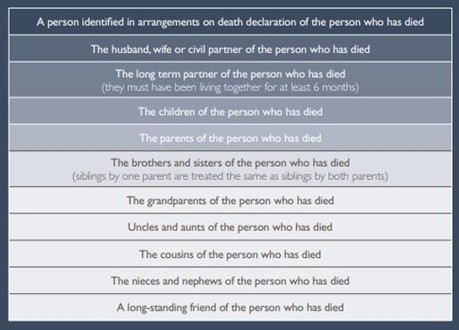If the deceased made a will, the legal responsibility for the funeral will lie with the person or people named as executors of the estate. If no will was made, then responsibility falls to the next of kin, which is typically the closest family member to the deceased.
Executor – An executor is someone who has been chosen by the deceased to deal with the estate, overseeing all the legal and administrative duties following their death. They can comprise family members, friends or someone such as a solicitor.
Next of kin – If there is no will, the responsibility for the funeral will lie with a person’s next of kin. The courts have a clear order of priority with regards to the hierarchy. The official order of priority is:

What if two people with the same entitlement can’t agree?
Occasionally disputes can occur when family members with the same entitlement can’t agree on who will oversee the funeral. This can cause additional distress and emotional turmoil for families unable to decide. A funeral director can take instructions from anyone who is entitled to arrange the funeral, unless an executor is allocated. If there is a dispute, it is advisable to seek legal advice before instructing your funeral director. A funeral director will typically ask for one point of contact to avoid any conflicting instructions in relation to the funeral.
Can someone unrelated to the deceased arrange a funeral?
Yes. Anyone can take on the task of arranging and paying for a funeral, regardless of whether they are related to the deceased. In some instances there may be no living relatives, or no one willing or able to take on the responsibility of arranging their funeral. If you are unrelated to the deceased but want to take on the arrangements, you would need to seek permission from any living relatives before instructing a funeral director.
If you have any questions or would like to discuss your options further please give us a call on 01793 522797 or get in touch.
